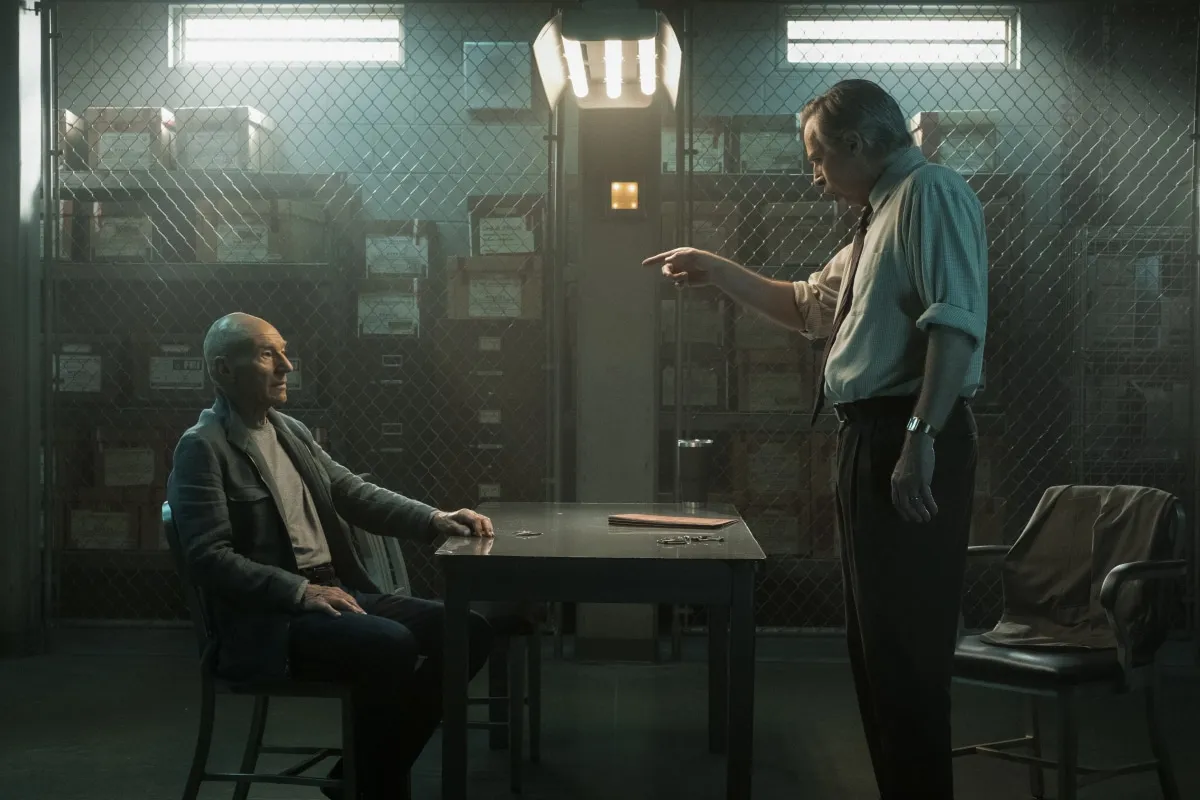This discussion and review contains some spoilers for Star Trek: Picard season 2, episode 8, “Mercy.”
While it doesn’t break a lot of new ground, “Mercy” at least represents a significant improvement over “Monsters.” Part of this is simply down to the fact that it is playing a mode where Star Trek: Picard feels more comfortable. A lot of “Mercy” is essentially plot-driven setup.
As tends to be the way in the closing stretch of these season-long arcs in modern Star Trek, the audience can see the various pieces being lined up and moved into position. Characters cross paths because the plot demands that they interact. Certain story threads are stalled so that others can catch up and they can move together into the climax. It is inelegant and clumsy, but there is a certain efficiency at play that doesn’t always come through in Picard’s bigger moments.
The episode’s weakest thread is the interrogation subplot that finds Picard (Patrick Stewart) and Guinan (Ito Aghayere) cast in a lame X-Files knock-off with Agent Wells (Jay Karnes) in an “FBI Field Office Basement.” This is transparently a way of taking Picard off the board for the episode while the rest of the story just happens around him. Indeed, the conclusion of the arrest subplot is that it doesn’t really have any consequences at all.
As with the scenes that Picard shared with Jurati (Alison Pill) and the Borg Queen (Annie Wersching) in “Assimilation,” it feels like an effort to limit Patrick Stewart’s potential COVID exposure by placing the octogenarian actor on a closed set with a small cast. It is commendable from a production standpoint, in the sense that any decision to produce a show with a leading actor of Stewart’s age in the middle of a pandemic can be commendable. However, it is narratively inert.

Agent Wells feels like a familiar Star Trek archetype, particularly in time travel stories like these. Wells is an outsider and an eccentric who doesn’t entirely fit in with the world around him, and so he finds some kinship with these displaced explorers. He is similar, in many ways, to Gillian Taylor (Catherine Hicks) from Star Trek IV: The Voyage Home or Rain Robinson (Sarah Silverman) from “Future’s End.”
There is an interesting hook in the idea of a character changed by an encounter with Star Trek aliens just a little too early in the timeline. The idea of Wells stumbling across a Vulcan science team feels of a piece with classic Star Trek stories about pre-First Contact missions like “Carbon Creek” or Strangers from the Sky. Unfortunately, “Mercy” has no idea what to do with Wells beyond turning him into a cheap rip-off of Agent Fox Mulder (David Duchovny) from The X-Files.
The subplot focusing on Adam Soong (Brent Spiner) is at least stronger, because it returns to some of Picard’s more interesting thematic meat. Soong’s relationship with Kore (Isa Briones) returns to the generational conflict that informed so much of the first season, the sense of children struggling against parents who fail to understand them or engage with them as more than extensions of their own ego, a resonant theme in modern science fiction.
Soong finds himself struggling with Kore’s desire to assert her own identity, stung by the revelation that she is the latest in a long line of clones engineered by Soong. “You exist because I willed it,” Soong warns her. Later, she challenges him, “If I walk out that door right now, what are you afraid of losing? Me, or your legacy?” Soong sees this as a betrayal, “You don’t get to walk away from me. You don’t exist without me.” Kore counters, “Maybe it’s you who doesn’t exist without me.”

At its best, Picard is a story about an older generation reckoning with their legacy. Rob Salkowitz has described it as a “final cry of rage” from the Silent Generation, and much of the show finds older characters confronting their mortality and the idea that they are handing over a fundamentally broken world to those who would replace them. It’s an idea that resonates in an era of generational conflict over the direction of the American project between older and younger people.
Although the series suffers from a lack of willingness to follow through on its themes, many of the older characters in Star Trek: Picard find themselves confronted by questions of mortality and legacy. Talking with Guinan, Q (John de Lancie) reveals that he is “dying.” Expecting to find the “warm glow of meaning” in his passing, he has seen “not even a glimmer.” Q has seemingly descended into a sort of grim nihilism, confronting the possibility that he is “simply disappearing, into nothing.”
As such, Soong and Q serve as two sides of the same coin. They insist on leaving behind a world shaped by their views but seem decidedly uninterested in what that world will be like for the people who will have to live in it. Patrick Stewart has talked about how part of the appeal of Picard was the opportunity of “responding to the world of Trump and Brexit,” and it’s worth noting that in both cases those political choices were made by the older generation for those that would follow.
There is a resonance to Adam Soong’s choice to betray his daughter in order to become “father of the future,” sacrificing a potential paradise that would forget him in favor of a dystopia that would build statues in his honor. “Earth in your time finds itself in ecological freefall,” Jurati warns him. “The man they turn to is you, if only you’re given the opportunity. You lose a daughter but become godfather to a world.” Soong’s inability to confront his own mortality becomes monstrous.

There is something interesting in the way that “Mercy” brings together Soong and Jurati, essentially blending two of the Star Trek franchise’s long-standing transhuman and cyberpunk anxieties into a single threat. Soong is a geneticist, tying into the franchise’s deep-seated anxiety over genetic engineering dating back to “Space Seed.” Jurati is the Borg Queen, the living manifestation of the franchise’s fear of technological augmentation of the human form.
“Mercy” doesn’t necessarily do anything interesting with these overlapping threads, but it is still a nice thematic overlap. Indeed, to the episode’s credit, there are a number of small and compelling parallels both within “Mercy” and within the larger season of Star Trek: Picard. Wells’ childhood trauma provides an effective mirror to that articulated by Picard in “Monsters.” The script even reinforces this point of comparison by having Wells talk about “the thing in the night, the monster in the dark.”
Wells’ misunderstanding of the Vulcans’ attempts to ease his suffering “so (he) wouldn’t be haunted like this” also neatly parallels Picard’s own evolving understanding of his father’s (James Callis) behavior in “Monsters.” There’s likewise a nice physical contrast with the benign Vulcan mind meld and the more intrusive Borg assimilation, with the gestures consciously mirrored. The implication is that the line between kindness and cruelty is often thinner than it might first appear.
However, the best of the episode’s three major plot threads concerns Seven (Jeri Ryan) and Raffi (Michelle Hurd) trying to track down Jurati. It’s a plot thread that consciously and deliberately foregrounds one of the big recurring themes of the second season of Picard, suggesting that the show can be read as a metaphor for mental health. Jurati’s struggles against the Borg Queen play as an overt allegory for living with a psychological condition.

At one point, Seven tries to get into Jurati’s head, drawing on her own experiences of the Borg Collective. “I’d want nothing,” Seven confesses. “In her shoes, I’d want nothing except that connection. If you felt it, it would be hard to think of anything except getting it back.” It is a choice that presents Jurati as an addict, which is consistent with previous portrayals of drones separated from the hive, particularly Seven herself in “The Gift” and “Survival Instinct.”
There is a sense in which the show is building on the rather clumsy Red Dragon and The Silence of the Lambs type of portrayal of Jurati’s relationship to the Queen in episodes like “Assimilation” or “Watcher.” Seven sounds like she is profiling a serial killer. “She can’t have what she wants, so she tried to recreate that feeling of connection, one on one,” she explains. “She didn’t feel anything one on one; it wasn’t enough. She grew frustrated, angry. Took it out on what couldn’t satisfy her.”
However, there’s something quite smart in Raffi’s immediate observation that, despite Seven’s attempt at a hardboiled monologue, she is instead describing a fairly basic act of emotional violence that explains Seven’s own intimacy issues. In a small but revealing thematic touch, it feels appropriate that Jurati is harvesting cell phone batteries for lithium as “a stabilizing metal,” given lithium’s use as a treatment for depressive or manic episodes.
As in “Two of One,” there is also a nice acknowledgement of the privilege that Seven enjoys as a white woman once the facial disfigurement and racial “otherness” signified by her Borg implants are removed. “People are so easy when they trust you,” Seven tells Raffi, reflecting on how easy it is to wander around Los Angeles when she looks like Jeri Ryan. “No wonder I’m president.” It is a small touch and it is a shame that Raffi never presses on this, but it is interesting nonetheless.
“Mercy” is an imperfect episode in a deeply imperfect season of Star Trek: Picard, but it works surprisingly well in its smaller moments and character beats. As the second season of Picard grows increasingly narratively and thematically muddled, perhaps audiences should be thankful for small mercies.






Published: Apr 21, 2022 11:00 am